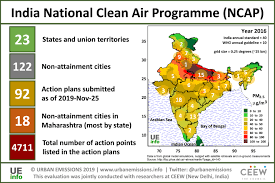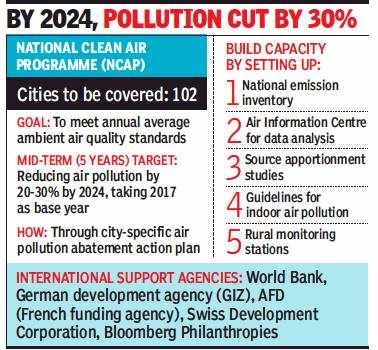





Disclaimer: Copyright infringement is not intended.
Context:
Implementation status
Impacts
Reasons For delays
How can scientific tools help?
Efficacy of the scientific tools:
About NCAP
Details about NCAP
|
Non-attainment cities: They are those that have consistently failed to meet National Ambient Air Quality Standards (NAAQS) for over five years. NAAQS Standards: NAAQS are the established standards for ambient air quality concerning various pollutants notified by the CPCB under the Air (Prevention and Control of Pollution) Act, 1981. These include PM10, PM2.5, SO2, NO2, CO, NH3, Ozone, Lead, Benzene, Benzo-Pyrene, Arsenic, and Nickel. |

Conclusion:
India, as charted by NCAP, will be difficult but is necessary. NCAP's success hinges on a multifaceted approach that combines rigorous scientific studies, strategic funds, and swift and effective implementation of mitigation measures.
For more on NCAP read:
https://www.iasgyan.in/daily-current-affairs/national-clean-air-programme-29
Source:
|
PRACTICE QUESTION Q) In the cities of our country, which among the following pollutants are normally considered in calculating the National Ambient Air Quality Standards? (2016)
Select the correct answer using the code given below: (a) 1, 2 and 3 only Ans: (b) NAAQS (National Ambient Air Quality Standards) are the established standards for ambient air quality concerning various pollutants notified by the CPCB under the Air (Prevention and Control of Pollution) Act, 1981. These include PM10, PM2.5, SO2, NO2, CO, NH3, Ozone, Lead, Benzene, Benzo-Pyrene, Arsenic, and Nickel. While the NAAQS 2009 covers 12 pollutants, the AQI focuses on 8 major pollutants. AQI includes all the NAAQS pollutants except benzene, benzopyrene, arsenic, and nickel. |











© 2024 iasgyan. All right reserved